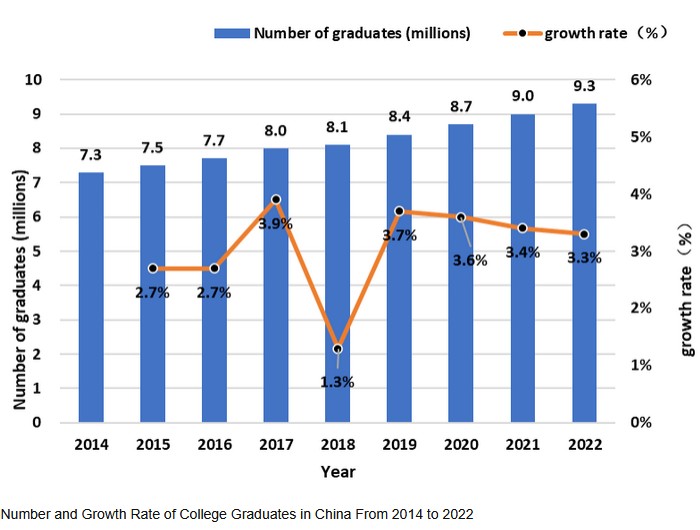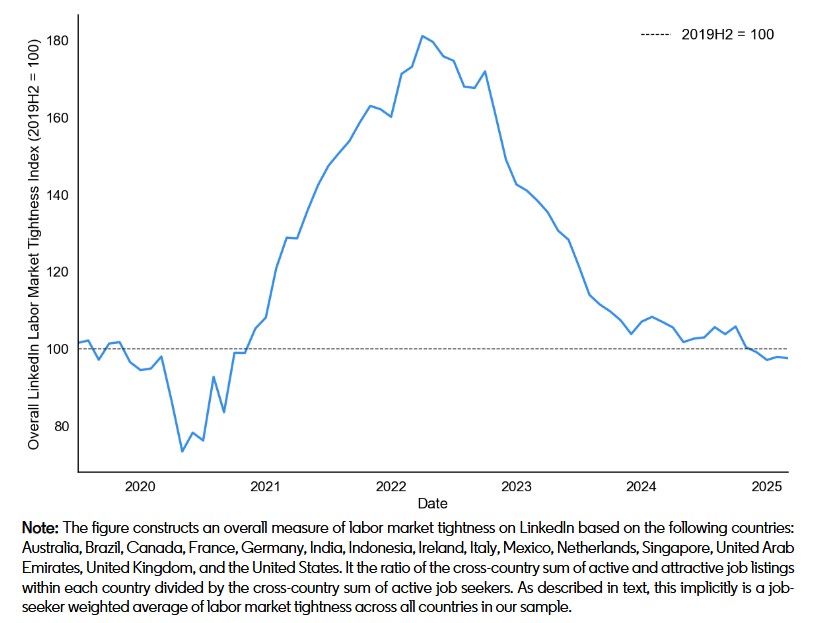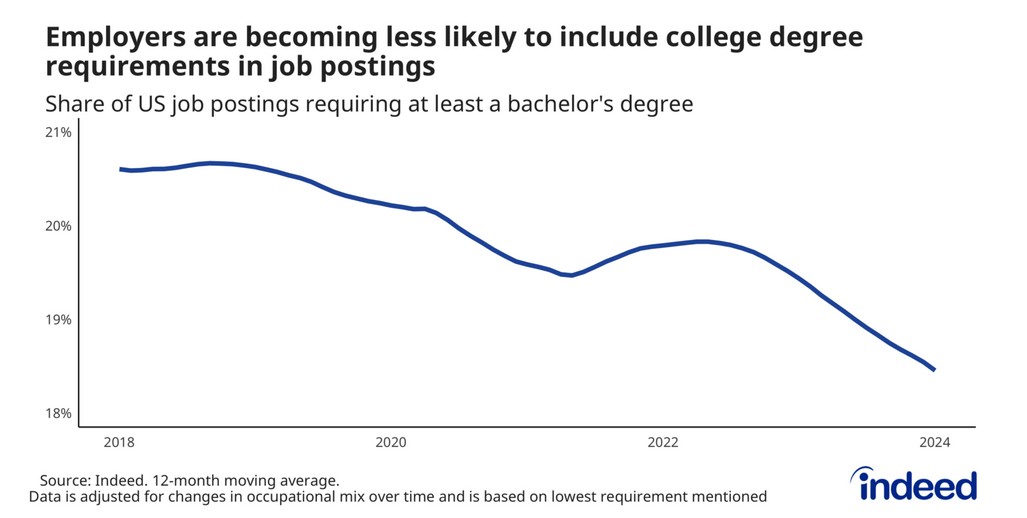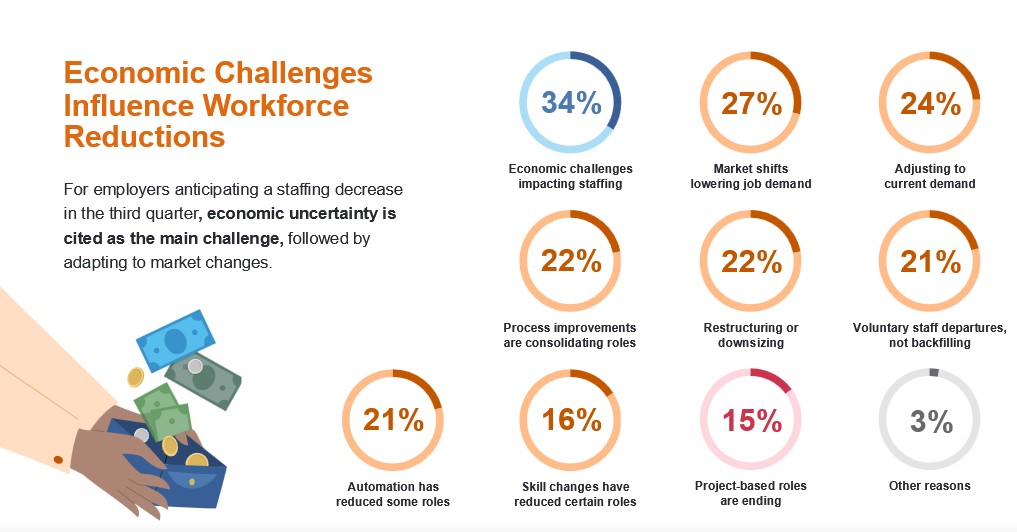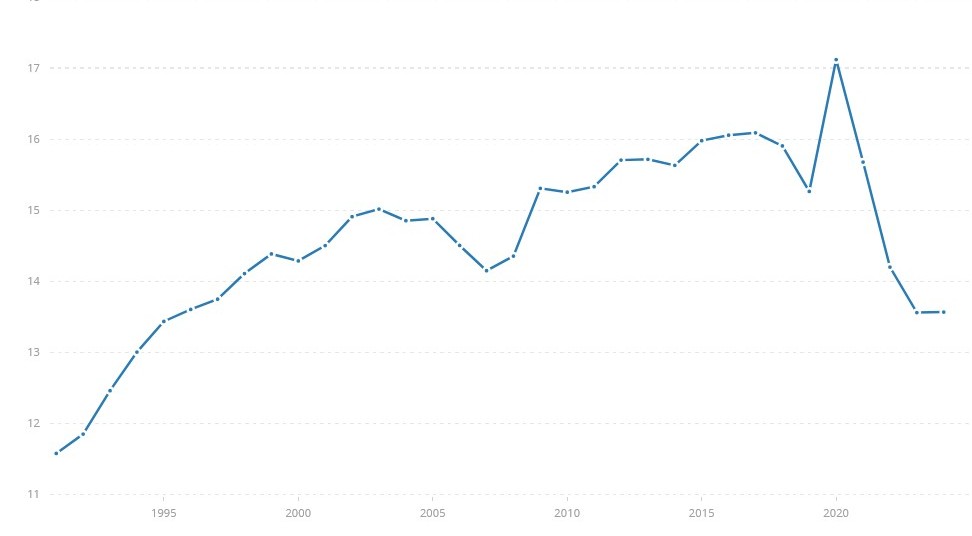The 2025 Graduate Jobs Crisis
Jul 15, 2025 12:31 pm
Hi,
Graduates are having a hard time finding a job. And I was intrigued by the many posts that provided a simple explanation: AI is taking over entry-level jobs. The labor market is notoriously complex, so when it's that simple, my spidery senses go up. And I did what I always do: look at the data.
I hope you enjoy this article that provides a deep dive in the labor market for graduates. It's difficult to find a job, that's for sure. But solving the problem requires a better explanation. Let me know what you think!
Happy summer, Anita
PS: And if you really want to help your graduates make an excellent start, gift them a copy of my latest book: What's Up With My Pay? It explains everything about pay and compensation I wish I knew when I signed my first job offer!
The 2025 Graduate Jobs Crisis: It’s Not AI
You’ve seen the headlines: “AI is wiping out entry-level jobs.”
The global narrative seems simple enough: AI is taking over entry-level jobs. New graduates can’t find a job and have nowhere to go. But is that the whole story?
I don’t like this explanation at all: it’s too clean. Labor market changes can never be explained by just one thing. What we’re seeing isn’t just caused by AI. I think it’s a perfect storm of labor issues that has been building for years. So, let’s break down the real forces behind the hiring slowdown. I’ll also mention what grads, employers, and educators can do about it. Because when you have put all your effort (and money!) into graduating, there’s nothing worse than not being able to work in your chosen field.
Do we have too many graduates?
Let me start with an uncomfortable truth: we may simply have more graduates than entry-level jobs requiring a degree. Degrees used to be scarce and valuable. Now they’re common. In many countries, over 40% of young adults have tertiary education, compared to 20% two decades or so ago. It’s a great educational achievement! But have our labor markets evolved fast enough to absorb them all into “graduate-level” roles? I don’t think so. Just look at the increasing number of graduates in China, while knowing that the number for 2025 is an estimated 12.2M:
In addition, many graduates still chase roles in tech and finance. These fields are known for their prestige and high paychecks. But in 2025, in many regions the real job growth is in healthcare, education, government, wholesale, retail and leisure. These sectors are often overlooked by grads because of their lower pay and perks. But they continue to hire and offer stable career paths. This mismatch between graduate aspirations and market reality is causing unnecessary friction.
This creates a cascade effect. The competition for graduate roles intensifies. And graduates end up in jobs that don’t require degrees. Economists call this underemployment. There’s a fundamental mismatch between what graduates expect (knowledge work) and what many employers actually need (people who can execute).
Combine that with the fact that globally the labor market tightness has returned to pre-pandemic levels, and it’s clear that there are simply fewer vacancies available. We could also say that the past few years were the exception, and we are now back to normal. Many companies overhired during the pandemic and now post fewer vacancies. It’s not that graduates are unwanted. It’s that there are too many chasing the same types of jobs that have always existed, while the number of those jobs hasn’t grown proportionally.
Skills-based hiring is here
Companies are increasingly shifting away from degree requirements toward skills-based hiring. That sounds progressive, and in many ways it is. But there’s a catch that fresh graduates are learning the hard way: skills-based hiring favors proven ability, not just potential. And when companies switch to skill-based hiring, they often don’t list a degree in the vacancy. As the chart shows, the number of US job postings requiring a degree is declining. I’m pretty sure that’s also happening in other countries.
The job market is essentially saying: “Show me what you can do,” not “Tell me what you studied.” Graduates often lack practical experience in team collaboration, industry-specific tools, and the kind of problem-solving that comes from actually doing the work, not just learning about it. In HR, we’ve been moving towards this for years. We’ve just not helped graduates understand that a resume showing educational achievements isn’t enough anymore. And that’s something we need to fix urgently.
The changing definition of “entry-level”
Here’s something that is particularly frustrating for graduates: the definition of the term “entry-level” is changing. Many employers now expect 1-2 years of experience even in junior roles. That experience can come from internships, side projects, apprenticeships, or gig work. It’s not necessarily a previous full-time job.
At the same time, new roles are emerging that don’t have standardized career paths. Community managers, ethics analysts, AI trainers: these positions didn’t exist in career guidance when today’s graduates were choosing their majors. Graduates may be overlooking entry routes because they don’t look like classic “graduate jobs.”
Many graduates hold out for what they consider a “good” job: full-time, well-paid, aligned with their degree. I understand this impulse, but those roles are rare to land immediately. Employers, meanwhile, want candidates who’ve already demonstrated grit, adaptability, and initiative. It’s not just about jobs being scarce. It’s also about how graduates define success and whether they’re willing to take non-traditional paths to build that initial experience.
Economic headwinds make employers cautious
When we are talking about the labor market, we can’t ignore the broader economic environment. Tariff uncertainties and rising labor costs are making firms cautious. They make do with what they have and only hire when it’s strictly necessary. And we see that play out across the globe. Unfortunately, it won’t change until the market stabilizes and the economic outlook is more favorable. But as the Q3 2025 Employment outlook shows, there are many reasons why companies aren’t hiring at the moment, with automation being just one, and not the most important factor:
In the US, there’s an additional factor that’s particularly influencing the tech labor market. And though it’s often packaged as “AI replacing employees”, the real narrative is that companies can no longer immediately deduct R&D expenses (2022 changes to section 174 of the tax code). Instead, they must spread these deductions over 5 or 15 years. Since 2023, the tech industry has shed more than half a million jobs. The large tech companies all eliminated thousands of positions, often in the very teams most affected by the loss of immediate R&D deductions. This isn’t just a typical economic adjustment. It’s a uniquely American policy that’s systematically decreasing the R&D teams where many new graduates traditionally found their first opportunities.
The hidden job market
Job listings have dropped, but the number of applicants is higher than ever. The BBC reported that UK graduate job listings received an average of 140 applications in 2024. It’s the highest in 30 years and a 50% jump from 2023. So the conclusion is often that there are more applicants. But I’ve spoken to recruiters who see hundreds of applications come in the first half hour after a vacancy goes live. From people all over the world, even for local positions. Something else is happening: candidates have figured out how to use AI to auto respond to your listing. And that means we can’t use the number of applications as a reliable indicator of the job market anymore.
But not all jobs are posted publicly. In small- and medium-sized businesses especially, hiring happens through referrals, intern-to-hire pathways, and direct outreach. If graduates only apply through job boards, they miss many real opportunities. But if most of your life happens online, you might not have access to the networks where these jobs are shared. I’ve seen talented graduates spend months applying to posted positions while missing the networking opportunities that could lead to actual jobs. It’s a skill I encourage all of them to develop: ask around, develop and use your network. The hidden job market is real, and it’s where many of the best entry-level opportunities actually exist.
What about AI, then?
There is no question that AI is automating entry-level tasks that graduates traditionally performed, like basic data analysis, content writing, simple coding tasks, customer service responses, and routine research. Some companies are using AI tools instead of hiring additional junior staff for these functions.
But the impact varies by region and sector. In Asia, where manufacturing and technology integration are more advanced, the displacement might be more visible. In Europe, with stronger labor protections, the transition will be more gradual. And in all regions, many roles aren’t disappearing. They are transforming. Marketing roles now often require familiarity with AI tools. Analysts need to know how to work alongside AI systems. Graduates who can adapt to these AI tools may actually have advantages. Let’s be honest: it’s way too early to determine the effect of AI on the workforce. Research shows that AI is far from ready to take over jobs. Gartner predicts over 40% of AI projects will be canceled by the end of 2027.
Still, that means 60% will succeed. AI does also generate new opportunities: AI trainers, prompt engineers, AI ethics specialists, and roles focused on managing AI systems. However, these often require specific skills that many graduates don’t yet have. Even though they’ve used AI in writing their thesis, it does not mean they understand how to apply it in their jobs. There is always a gap between what graduates learn and what companies need. Many schools have not yet figured out how to incorporate AI in their curriculum and are debating whether to allow it at all. Action is needed: for organizations to specify their needs and for schools to adapt their teaching.
The real story about graduate jobs
It’s not simply that “companies don’t want graduates anymore” or that “AI is taking over entry level jobs.” It’s more accurate to say that graduates are entering a fundamentally changed labor market, where degrees are common, proof of skills matters more than credentials, and paths into good jobs are less structured than they used to be.
The scale of job losses we’re seeing, particularly in the US tech sector, is exceptional. But that is not just about AI. It’s about policy changes, economic uncertainty, pandemic overhiring, market oversaturation, and shifting employer expectations all coming together. The good news is that globally, the youth unemployment rate stands at 13% in 2023, the lowest in 15 years, even though there are regional variations (ILO):
Understanding this complexity matters because it changes how we respond. If the problem were just AI displacement, we should focus on AI skills training. But since the factors vary by region and country, we need a more comprehensive approach: one that addresses skills gaps, expectations, networking, policy failures, and the fundamental mismatch between educational outcomes and labor market needs. We need more nuanced, locally-adapted approaches.
The easy narrative of “AI is taking graduate jobs” sells clicks and provides a simple explanation, but it doesn’t help graduates navigate the complex reality they actually face. The reality is messier, more complex, and ultimately more actionable than the headline suggests. Most importantly, it requires understanding that while the changes are global, the solutions must account for local contexts, cultural expectations, and regional economic structures.
What’s happening to graduates isn’t just about technology: it’s about the intersection of demographic transitions, educational expansion, economic policy, cultural expectations, and technological change all colliding simultaneously across different regions in different ways. If you don’t understand how they work together, you will solve the wrong problem.
